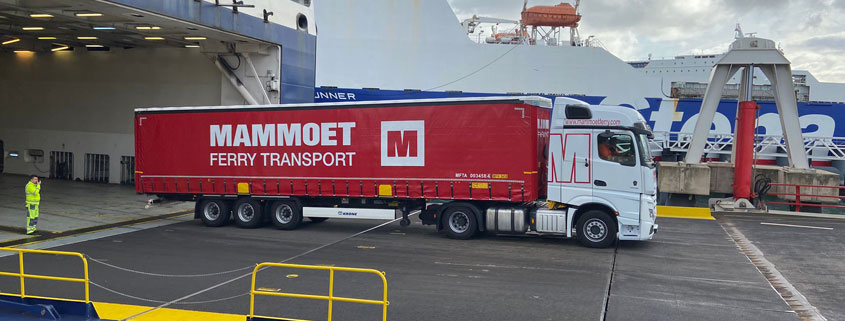Interview Mammoet Ferry: ‘Niche market that requires specific expertise’
“We are expanding our equipment because of Brexit. In a first step, we went from 400 to 485 trailers and now we are expanding to 600 trailers,” explains Paul Kruisbergen from Mammoet Ferry Transport. The operational director mentions three reasons. “First of all, we require more trailers for the same volume because of Brexit. Due to all the additional formalities, routes take longer. Furthermore, we expect to be able to achieve further growth in the traffic to the United Kingdom. In addition, we started directly serving Ireland from Rotterdam in early 2022.”
Waterbed effect towards unaccompanied transport
Brexit has had a positive impact on Mammoet Ferry Transport. Covid has also helped in that respect. “Our company only does unaccompanied transport. During Covid, we noticed a clear waterbed effect, in which cargo from the Channel routes with a lot of accompanied transport shifted to ports for unaccompanied transport.” Kruisbergen also notes that many carriers for which the United Kingdom was a by-product have exited due to Brexit. “The UK has now really become a niche market that requires specific expertise. Serving it has not become any easier. Not every carrier wants to get involved. That benefits us.” Of course, this does not happen all by itself. “We have recruited nine extra people within the organisation for the administrative processing of orders, feeding the customs systems, etc.”
Scaling up of knowledge
Mammoet Ferry Transport is part of logistics service provider NeeleVat. Through a team of 30 declarants, the company can also handle the entire customs clearance for customers. According to Kruisbergen, scaling up knowledge was the most important challenge in preparing for Brexit. “Dealing with documents was new to almost everyone. That certainly caused some problems in the first months after Brexit. Here, all data is transferred electronically via EDI messages. But ultimately, everyone needs to know what information is required for this. The biggest challenge was to update the knowledge of colleagues, customers and carriers in a short time. We have consistently endeavoured to communicate about this in a clear and straightforward manner. We want to make a difficult process as simple as possible for all parties involved. Both administratively and regarding the actual transport.”
Admission of weakness
Kruisbergen calls the UK postponement of the additional customs rules that were announced for the 1st of July 2022 a sign of weakness. “We were ready, the UK apparently wasn’t. The question is: when will they be ready? Repeated postponements make it difficult to explain to the logistics chain that it is necessary to prepare. So nine times out of ten, that happens at the very last minute.”
Rotterdam as an example
Mammoet Ferry Transport sails from Rotterdam using all ferry companies: DFDS, StenaLine, CLdN and P&O. Kruisbergen is positive about the manner in which the port has set up the required Brexit processes. “Especially the decision to organise the data exchange with all shipping lines through one single system via Portbase works very well. The United Kingdom could take Rotterdam’s approach as an example.” He would like it if the Netherlands were able to link the digital systems even further. “For example, so that the data from an export declaration can be automatically processed in the ENS (Entry Summary Declaration) and from there automatically end up in an import declaration.”
Time and attention prevent mistakes
After Brexit, Mammoet Ferry Transport was also faced with mismatches in the traffic from the United Kingdom to the Netherlands. Looking back, Kruisbergen concludes that in the initial period, Dutch Customs adopted a flexible approach in this respect. The ferry carrier has now managed to largely prevent mismatches between the manifest and the import declaration. “This is mainly due to our systems and EDI link-ups. At the front end, we have devoted a lot of time and attention to the information this requires. Now, we are really reaping the benefits of that.”



